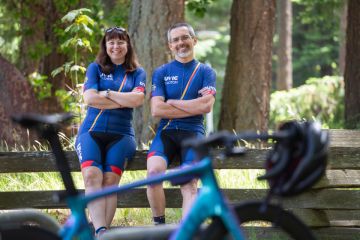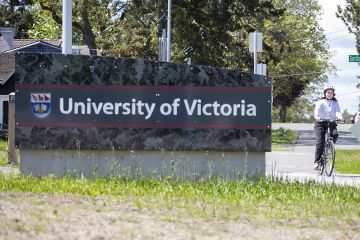Exercise for your mind
In case you needed one, here’s another good reason to exercise—it can make you smarter.
University of Victoria neuroscientist Dr. Brian Christie was one of the first researchers to discover that exercise stimulates the growth of brain cells in the hippocampus, an area of the brain involved with learning and memory.
The finding debunked the long-held belief that our brains aren’t able to produce new cells—known as neurons—as we age.
“We now know that new neurons are produced continually throughout our lives and that this process can be ramped up or dampened by our lifestyles,” says Christie. “In other words, the better we take care of our brains, the better they function.”
Christie studies the biological mechanisms in the brain that are activated by exercise. A deeper understanding of these mechanisms may ultimately result in new approaches to establishing, maintaining and even enhancing brain cells and their connections as we age.
The applications of Christie’s research are astonishingly broad. Exercise seems to reduce the impact of any stress on the brain, whether the stress comes from a hard day at work or from such neurological disorders as Alzheimer’s disease, autism, stroke or fetal alcohol spectrum disorder (FASD).
FASD refers to a spectrum of disorders associated with poor learning, attention, memory and behavioural problems.
“FASD is a tricky problem, because a lot of women don’t realize that they are pregnant in the early stages and can consume alcohol unwittingly, and they may not be aware of the toxic effects of alcohol on the developing fetus,” says Christie. “The bottom line is that no amount of alcohol is safe when you’re pregnant.”
The link between FASD and exercise first occurred to Christie at a medical conference. “The presenter was describing how children with FASD have fewer neurons in their hippocampus, and that these neurons are less branched,” he says. “This is the diametric opposite of the positive effects of exercise. It was a definite ‘aha’ moment.”
Using sophisticated microscopy and protein chemistry techniques, Christie and his team have demonstrated that exercise promotes the growth of new neurons in FASD brains, and that these neurons are better able to communicate with each other.
In fact, Christie was surprised by how big a difference exercise makes for FASD compared to other brain disorders he has studied. He believes daily exercise should be a key treatment for FASD, guessing that an hour a day, continuous or broken up, might be enough.
Christie notes that FASD can be very difficult to diagnose and children showing symptoms are often misdiagnosed with attention-deficit hyperactivity disorder (ADHD). These kids are typically discouraged from running around for fear they will get overexcited—clearly a bad strategy given his findings.
Christie and his team are now looking at the effects of different amounts of alcohol at various stages of pregnancy. They’re also investigating sex differences—it’s possible that testosterone makes developing brains more susceptible to alcohol damage, making FASD worse in boys.
Christie’s research is supported by the Canadian Institutes of Health Research, the Natural Sciences and Engineering Research Council and the Michael Smith Foundation for Health Research.




